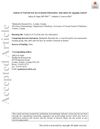A Qualitative Review of Misinformation on Alopecia
November 2024
in “
Skin Appendage Disorders
”

TLDR Misinformation about alopecia can lead to poor treatment, so it's important for healthcare professionals to correct myths.
The study reviews the prevalence of misinformation about alopecia found online, identifying myths about false causes, criticisms of conventional treatments, and promotion of unproven "natural" remedies. False causes include headwear and haircare practices, while conventional treatments like minoxidil and finasteride are often criticized. Unfounded alternative treatments such as biotin, fish oils, and rosemary oil are widely promoted despite limited evidence of efficacy. The study highlights the significant psychosocial impact of alopecia, which makes patients vulnerable to misinformation, and emphasizes the need for healthcare professionals to address and combat this misinformation. Limitations include the inability to review all online misinformation and the focus on English-language content.











